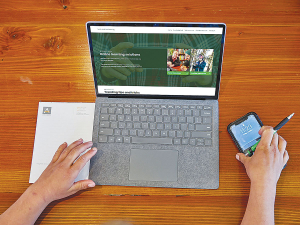Bags a major recycling problem
New Zealand agriculture’s effort to recycle its waste plastic is a good news story.
 techenabledlearning.nz is providing technology-enabled learning resources and information to educators and providers in the primary sector.
techenabledlearning.nz is providing technology-enabled learning resources and information to educators and providers in the primary sector.
A new website is providing technology-enabled learning resources and information to educators and providers in the primary sector.
The website www.techenabledlearning.nz has been developed from the experiences of teaching staff and learning in NZ's food and fibre sector. It is funded by the Tertiary Education Commission (TEC) and supported by the Food and Fibre Centre for Vocational Excellence (FFCoVE).
The threat posed by Covid-19 to the primary sectors led to the formation of the technology-enabled learning project, which was the start of a process that has resulted in this website. Research analytics specialist, Scarlatti, was commissioned to run the project, in conjunction with Dairy Training NZ, Wintec and the Primary ITO.
The project was designed to capture the experiences of the staff and students of training organisations delivering Vocational Education and Training for the primary sector. The aim was to better understand the role of technology during lockdown, its unique needs and how technologically-enabled learning experiences could be enhanced in future.
An original focus was to find new modes of training and how to best support the attraction and retention of workers displaced from other industries. However, the direction and outputs of the project was informed by the initial research and the managers, tutors and learners interviewed who brought their own experiences of the lockdown levels.
Paul Hollings, general manager of the Food and Fibre CoVE, says the information gathered during the project was too good not to use in a meaningful way.
"There is a danger when a research project is done that it ends up in a report that is not widely circulated. The whole idea with this website was to actually make that information accessible to those who needed it."
Hollings adds that while the website is designed specifically for New Zealand Primary Industry tutors and providers, it is relevant to all tutors and providers across the vocational education and training sector.
“Given the rural setting of the industries making it up, we have genuine problems around connectivity in the food and fibre sector and the site addresses that by identifying areas of good and bad connectivity and providing work around ideas,” he explains.
Tutors have the ability to create their own toolkit of resources that they feel are suitable to them. An interactive dashboard is available to find out what the research says about technology-enabled learning in the food and fibre sector. Education providers are also given information on how to implement effective learning solutions. There is also a calculator for return on investments, a connectivity map highlighting areas of poor reception, and practical tips for infrastructure.
Former Agriculture Minister and Otaki farmer Nathan Guy has been appointed New Zealand’s Special Agricultural Trade Envoy (SATE).
Alliance Group has commissioned a new heat pump system at its Mataura processing plant in Southland.
Fonterra has slashed another 50c off its milk price forecast as global milk flows shows no sign of easing.
Meat processors are hopeful that the additional 15% tariff on lamb exports to the US will also come off.
Fears of a serious early drought in Hawke’s Bay have been allayed – for the moment at least.
There was much theatre in the Beehive before the Government's new Resource Management Act (RMA) reform bills were introduced into Parliament last week.

OPINION: The release of the Natural Environment Bill and Planning Bill to replace the Resource Management Act is a red-letter day…
OPINION: Federated Farmers has launched a new campaign, swapping ‘The Twelve Days of Christmas’ for ‘The Twelve Pests of Christmas’ to…